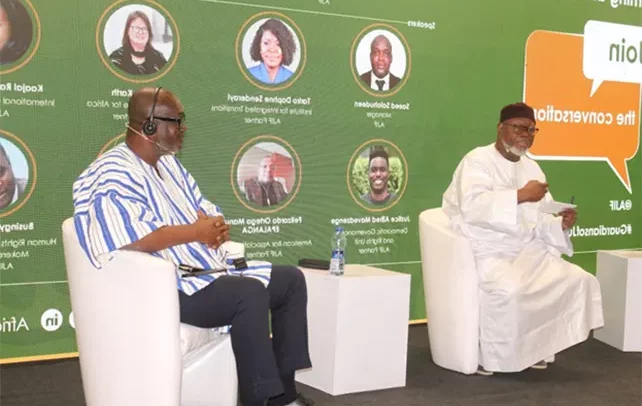Prof. Alioune Tine (left) and Mr. Kwasi Prempeh (right) in a panel discussion
The Africa Judicial Independence Fund (AJIF) convened a learning and exchange programme to review progress and explore innovative ways to advance judicial independence across Africa.
The Fund Manager of Afrobarometer, Saeed Salahudeen, said the Africa Judicial Independence Fund, an initiative of Afrobarometer, aims to strengthen judicial independence in Africa.
“The fund supports interventions focusing on merit-based appointment systems, tenure and financial autonomy, judicial accountability, and regional cooperations,” he said.
According to him, a landscape scan report on judicial independence in Africa is available, serving as a basis for impactful interventions and partnerships across the continent.
The Board Member of Africa Judicial Independence Fund (AJIF), Mr. Kwasi Prempeh, delivering his keynote address, highlighted crucial challenges undermining judicial independence in Ghana, noting that the judiciary remains structurally dependent on the executive, particularly for funding and enforcement of court decisions, which exposes it to potential political interference.
According to him, the judiciary, being unelected, often faces pressure from elected officials who claim superior democratic legitimacy, thereby challenging the authority of the courts.
Further, he pointed out that, partisan political polarisation continues to draw the judiciary into political and ideological battles, threatening its impartiality.
Mr. Prempeh expressed concern over the weak appointment and removal processes, stating that the president holds broad discretion in appointing judges, while Parliament plays only a limited role, adding that the removal process is vulnerable, as it can be triggered by a simple petition to the president.
He specifically mentioned issues such as court packing due to the absence of a constitutional cap on the number of Supreme Court judges, and the lack of clear standards and time limits for resolving presidential election petitions.
Mr. Prempeh, however, acknowledged that the 1992 Constitution provides some safeguards for judicial independence, including financial autonomy and penalties for executive defiance of Supreme Court orders.
“Despite these protections, constitutional gaps remain, especially regarding the number of judges, weak appointment procedures, and unchecked administrative authority,” he stressed.
To address these concerns, he recommended capping the number of Supreme Court judges, strengthening the appointment process to ensure fairness, setting clear timelines for election petition adjudication, and limiting the powers of the Chief Justice to prevent abuse.
“By implementing these reforms, Ghana can protect the independence of the judiciary and uphold justice for all,” he said.
The founder of Afrikajom Center, Prof. Alioune Tine, in his speech, noted that political influence, particularly from emerging populist regimes and ongoing democratic crises, has undermined public confidence in the separation of powers.
According to him, access to justice also remains limited, as legal professionals are concentrated in major cities, infrastructure is inadequate, and public trust in the justice system is weak.
He stressed that, judicial independence is crucial for upholding the rule of law and protecting individual rights, yet “in many Francophone African countries, the judiciary remains highly susceptible to political pressure.”
He thus called for urgent reforms, including strengthening judicial infrastructure and personnel, safeguarding the independence and tenure of judges, and promoting transparency and accountability within the justice system.
“These measures are essential to building a strong, independent, and trusted judiciary in Francophone Africa,” he concluded.
By Janet Odei Amponsah


